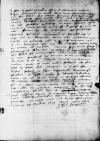Quod te non salutaverim rediens Angia Leuven (Louvain, Lovanium), city in the Low Countries, Duchy of Brabant, 25 km E of Brussels, University town from 1425, today in Belgium⌊LovaniumLeuven (Louvain, Lovanium), city in the Low Countries, Duchy of Brabant, 25 km E of Brussels, University town from 1425, today in Belgium⌋, in causa fuit nova calamitas; redditus enim fui subito sive catarrho, sive vento, sive quod magis credo utroque, paene inutilis altero oculo, a quo malo nondum liberatus sum. Ubi ad me rediero, dabo operam, ut tibi gratificer quibuscumque in rebus potuero, idque — ita me Deus iuvet — tam ex animo quam ulli principi, qui vivit toto orbe. Fama hic est Charles V of Habsburg (*1500 – †1558), ruler of the Burgundian territories (1506-1555), King of Spain as Charles I (1516-1556), King of Naples and Sicily, King of the Romans (1519-1530), Holy Roman Emperor of the German Nation (elected 1519, crowned 1530, abdicated 1556); son of Philip I the Handsome and Joanna the Mad of Castile⌊imperatoremCharles V of Habsburg (*1500 – †1558), ruler of the Burgundian territories (1506-1555), King of Spain as Charles I (1516-1556), King of Naples and Sicily, King of the Romans (1519-1530), Holy Roman Emperor of the German Nation (elected 1519, crowned 1530, abdicated 1556); son of Philip I the Handsome and Joanna the Mad of Castile⌋ ite profecturu adscribed⌈ruru adscribed⌉m Tournai (Tornacum, Doornik), city in the Habsburg Netherlands, ca. 80 km SW of Brussels, on the Schelde (Scheldt) river, centre of the territory of Tournai and the Tournaisis, which was incorporated into the Habsburg Netherlands in 1521; now in the Belgian province of Hainaut⌊TornacumTournai (Tornacum, Doornik), city in the Habsburg Netherlands, ca. 80 km SW of Brussels, on the Schelde (Scheldt) river, centre of the territory of Tournai and the Tournaisis, which was incorporated into the Habsburg Netherlands in 1521; now in the Belgian province of Hainaut⌋, quem credo comitaturum te; permittes ergo, ut ergo, dum tu Brussels (Bruxellae), city in the Low Countries, Duchy of Brabant, since the regency of Mary of Hungary the capital of the Habsburg Netherlands, today the capital of Belgium⌊BruxellaBrussels (Bruxellae), city in the Low Countries, Duchy of Brabant, since the regency of Mary of Hungary the capital of the Habsburg Netherlands, today the capital of Belgium⌋ aberis, curem valetudinem meam. Habebis me, quandocumque voles et quocumque vocaveris, etiamsi in Sarmatiam ipsam aut ultra; propter candorem animi tui venire non recusabo. Venit quantum audio Brussels (Bruxellae), city in the Low Countries, Duchy of Brabant, since the regency of Mary of Hungary the capital of the Habsburg Netherlands, today the capital of Belgium⌊BruxellamBrussels (Bruxellae), city in the Low Countries, Duchy of Brabant, since the regency of Mary of Hungary the capital of the Habsburg Netherlands, today the capital of Belgium⌋ Girolamo Aleandro (*1480 – †1542), born in Motta di Livenza; 1528-1541 Archbishop of Brindisi, 1538-1542 Cardinal-Priest of S. Crisogono ⌊Hieronymus AleanderGirolamo Aleandro (*1480 – †1542), born in Motta di Livenza; 1528-1541 Archbishop of Brindisi, 1538-1542 Cardinal-Priest of S. Crisogono ⌋, vir doctus et linguarum peritissimus, sed Italus per omnia; cuperem valde iudicium eius scire de mea paraphrasi. Sed hoc unum te oro, ut diligenter illi dicas, si cum eo in colloquium veneris, me sententiam reddere conatum, non verbo verbum, quemadmodum alii plus satis ex Hebraeo fidi interpretes et, ne opus esset lectori prolixis et saepe dispendiosis commentariis, pluribus id aliquando superinscribed⌈aliquandoaliquando superinscribed⌉ egisse verbis quam Hebraice habentur, orare me ut de re iudicet, an sententiam assecutus illi videar ... illegible⌈...... illegible⌉ et libellus dignus illi videatur, qui in aliorum manus veniat, non tamquam nova versio, quae ullam ex veteribus antiquare velit, sed tamquam paraphrasis, plurima loca ab auctoribus superinscribed in place of crossed-out interpretibus neque a⌈interpretibus neque aauctoribusauctoribus superinscribed in place of crossed-out interpretibus neque a⌉ vel on the margin⌈velvel on the margin⌉ Graecis vel superinscribed in place of crossed-out neque a⌈neque avelvel superinscribed in place of crossed-out neque a⌉ Latinis ob imperitiam linguae Hebraicae intellecta parum intellecta succinctissime explicans. Vale, Domine mi, non permittit me oculus meus vel lineam ullam addere.


 AAWO, AB, D. 3, f. 58v
AAWO, AB, D. 3, f. 58v